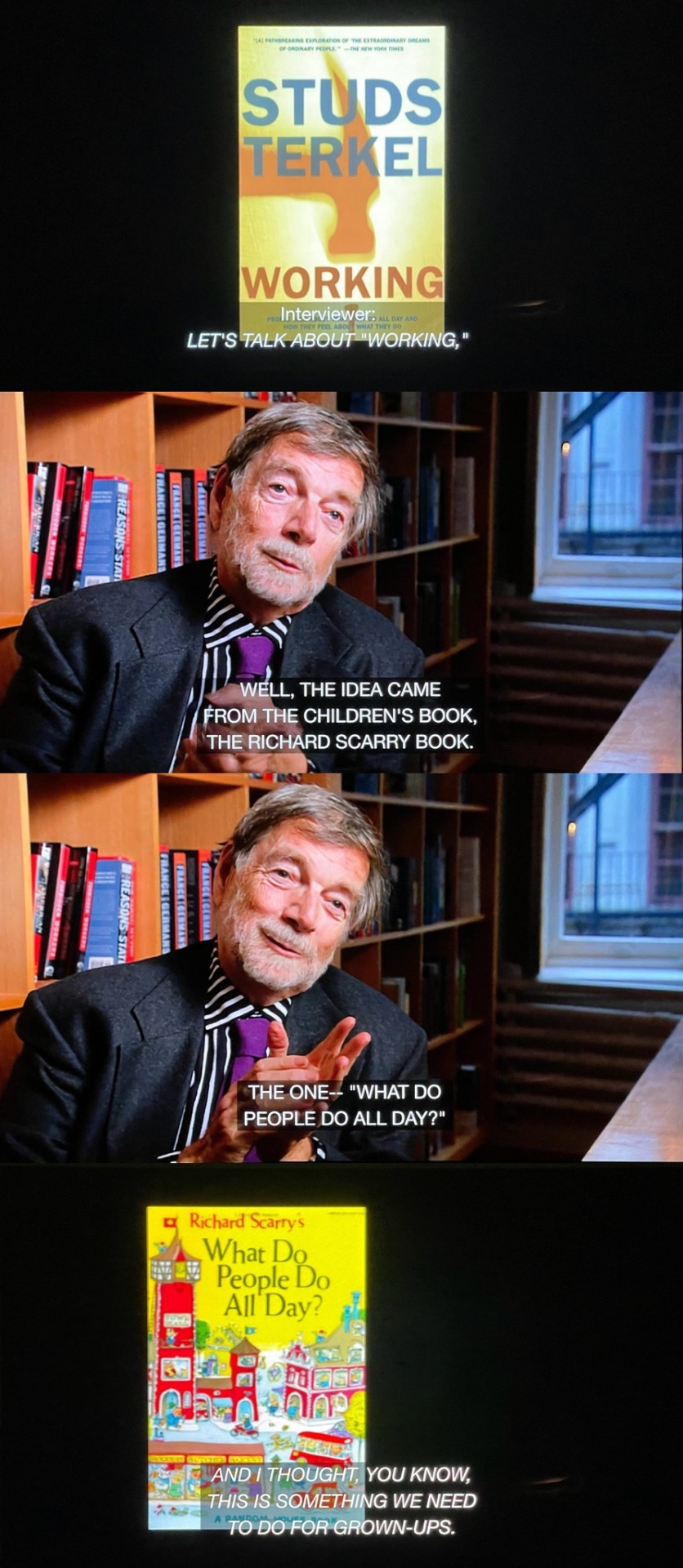#Studs Terkel
Text
It's happened to every one of us, I'm sure, that one has read something which you thought only happened to you and you discover that it happened a hundred years ago to Dostoyevsky. And this is a very great liberation for the suffering, struggling person who always thinks that he's alone. This is why it's important. Art would not be important if life were not more important. And life is important.
James Baldwin, in conversation with Studs Terkel, 1961
29 notes
·
View notes
Text
Studs Terkel interviews writer and artist Simone de Beauvoir at her home in Paris, France, where they discuss her family history, early writing career and artistic influences, individualism, and the creative commitment required to be a successful writer.
#studs terkel#simone de beauvoir#beauvoir#writing#terkel#art#france#paris#history#interview#archivist
17 notes
·
View notes
Text
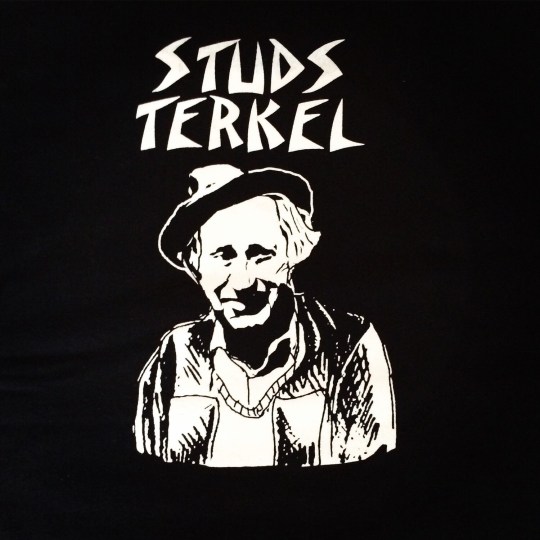
A design for a Studs Terkel shirt I saw, went to buy, and found it unavailable. I don't know who designed this but I hope they don't mind if I just make my own screenprint ('cause I think I'm gonna).
13 notes
·
View notes
Text
This book, being about work, is, by its very nature, about violence—to the spirit as well as to the body. It is about ulcers as well as accidents, about shouting matches as well as fistfights, about nervous breakdowns as well as kicking the dog around. It is, above all (or beneath all), about daily humiliations. To survive the day is triumph enough for the walking wounded among the great many of us.
The scars, psychic as well as physical, brought home to the supper table and the TV set, may have touched, malignantly, the soul of our society. More or less. ("More or less," that most ambiguous of phrases, pervades many of the conversations that comprise this book, reflecting, perhaps, an ambiguity of attitude towards The Job. Something more than Orwellian acceptance, something less than Luddite sabotage. Often the two impulses are fused in the same person.)
It is about a search, too, for daily meaning as well as daily bread, for recognition as well as cash, for astonishment rather than torpor; in short, for a sort of life rather than a Monday through Friday sort of dying. Perhaps immortality, too, is part of the quest. To be remembered was the wish, spoken and unspoken, of the heroes and heroines of this book.
There are, of course, the happy few who find a savor in their daily job; the Indiana stonemason, who looks upon his work and sees that it is good; the Chicago piano tuner, who seeks and finds the sound that delights; the bookbinder, who saves a piece of history; the Brooklyn fireman, who saves a piece of life . . . But don't these satisfactions, like Jude's hunger for knowledge, tell us more about the person than about his task? Perhaps. Nonetheless, there is a common attribute here: a meaning to their work well over and beyond the reward of the paycheck.
For the many, there is a hardly concealed discontent. The blue-collar blues is no more bitterly sung than the white-collar moan. "I'm a machine," says the spot-welder. "I'm caged," says the bank teller, and echoes the hotel clerk. "I'm a mule," says the steelworker. "A monkey can do what I do," says the receptionist. "I'm less than a farm implement," says the migrant worker. "I'm an object," says the high-fashion model. Blue collar and white call upon the identical phrase: "I'm a robot." "There is nothing to talk about," the young accountant despairingly enunciates. It was some time ago that John Henry sang, "A man ain't nothin' but a man." The hard, unromantic fact is: he died with a hammer in his hand, while the machine pumped on. Nonetheless, he found immortality. He is remembered.
Working: People Talk About What They Do All Day and How They Feel About What They Do, Studs Terkel, 1974.
19 notes
·
View notes
Text
STUDS TERKEL
I am reading Terkel's book Coming of Age. It is a chronicle of interviews he had with people who shaped the 20th Century. These aren't the people you would be familiar with. Stud's hung out with and was friends to the marginalized . He fought against any prejudice aligning himself with Blacks such as Mahalia Jackson, gay and lesbians, downtrodden workers, unionists, and was comfortable with anyone that was open, honest and willing to speak out. He had a Chicago radio program that interviewed people (we would call them podcasts today) from 1952 to 1997. He wrote oral histories of his famous people and of the everyday person. His oral history of people on the home front during WWII won a Pulitzer prize and made me love the way he wrote and spoke and how much he wanted to record the unspoken stories of everyone. He understood that everyone had a story to tell. I am sharing this because if you never heard of Studs Terkel, you are missing an American treasure. Check him out. Here is part of his story from Wikpedia:
A political leftist, Terkel joined the Works Progress Administration's Federal Writers' Project, working in radio, doing work that varied from voicing soap opera productions and announcing news and sports to presenting shows of recorded music and writing radio scripts and advertisements. In the late 1940's he voiced characters in WMAQ's Destination Freedom series, written by Richard Durham.[5] His own well-known radio program, titled The Studs Terkel Program, aired on 98.7 WFMT Chicago between 1952 and 1997.[6] The one-hour program was broadcast each weekday during those 45 years. On this program, he interviewed guests as diverse as Martin Luther King Jr., Leonard Bernstein, Mort Sahl, Bob Dylan, Alexander Frey, Dorothy Parker, Tennessee Williams, Jean Shepherd, Frank Zappa, and Big Bill Broonzy.
In the late 1940s and early 1950s, Terkel was also the central character of Studs' Place, an unscripted television drama about the owner of a greasy-spoon diner in Chicago through which many famous people and interesting characters passed. This show, Marlin Perkins's Zoo Parade, Garroway at Large, and the children's show Kukla, Fran, and Ollie are widely considered canonical examples of the Chicago School of Television.
Terkel published his first book, Giants of Jazz, in 1956. He followed it in 1967 with his first collection of oral histories, Division Street: America, with 70 people talking about the effect on the human spirit of living in an American metropolis.[7][8][9]
He also served as a distinguished scholar-in-residence at the Chicago History Museum. He appeared in the film Eight Men Out, based on the Black Sox Scandal, in which he played newspaper reporter Hugh Fullerton, who tries to uncover the White Sox players' plans to throw the 1919 World Series. Terkel found it particularly amusing to play this role, as he was a big fan of the Chicago White Sox (as well as a vocal critic of major league baseball during the 1994 baseball strike), and gave a moving congratulatory speech to the White Sox organization after their 2005 World Series championship during a television interview.
Terkel received his nickname while he was acting in a play with another person named Louis. To keep the two straight, the director of the production gave Terkel the nickname Studs after the fictional character about whom Terkel was reading at the time—Studs Lonigan, of James T. Farrell's trilogy.
Terkel was acclaimed for his efforts to preserve American oral history. His 1985 book "The Good War": An Oral History of World War Two, which detailed ordinary peoples' accounts of the country's involvement in World War II, won the Pulitzer Prize. For Hard Times: An Oral History of the Great Depression, Terkel assembled recollections of the Great Depression that spanned the socioeconomic spectrum, from Okies, through prison inmates, to the wealthy. His 1974 book, Working, in which (as reflected by its subtitle) People Talk About What They Do All Day and How They Feel About What They Do, also was highly acclaimed. Working was made into a short-lived Broadway show of the same title in 1978 and was telecast on PBS in 1982. In 1995, he received the Chicago History Museum "Making History Award" for Distinction in Journalism and Communications. In 1997, Terkel was elected a member of The American Academy of Arts and Letters. Two years later, he received the George Polk Career Award in 1999.
2 notes
·
View notes
Text
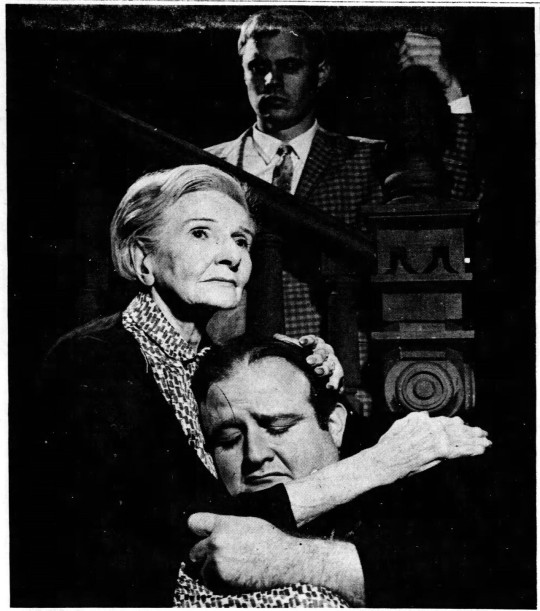
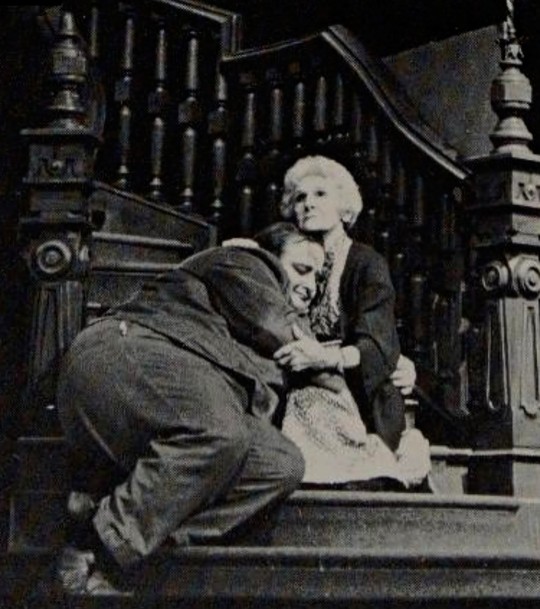


#holding him and kissing him on his cute beak shaped mouth#amazing grace#studs terkel#vb#alvadee's shit
2 notes
·
View notes
Text
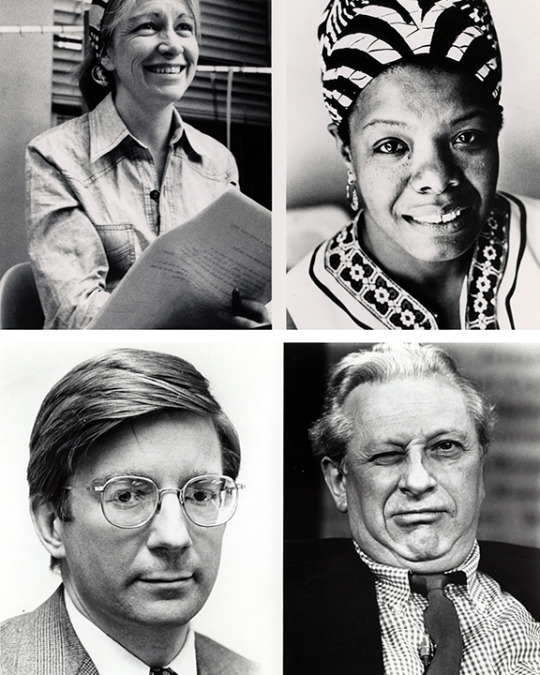
#PBSwednesday Almost forgotten today is "Assignment America," a 26-episode series from 1974-75 focusing on American issues. Rotating hosts Doris Kearns, Maya Angelou, Studs Terkel, and George F. Will offered half-hour profiles and video essays.
Kearns profiled advertising executive Gerry Della Femina, and protestant theologian Dr. Harvey Cox, for example. Angelou interviewed Ray Bradbury, Angela Davis, and James Baldwin, among others. Terkel's profiles included steelworker Ed Sadlowski, and Maggie Kuhn, head of the Gray Panthers. Will's interview subjects included liberal commentator Murray Kempton, and Playboy publisher Hugh Hefner.
Video essays included “Where Have All the Rebels Gone?” (Angelou) and "A Brooklyn All Their Own" (Kearns).
"The series generally featured little more than low‐budget variations on the 'talking heads' format," The New York Times commented (6/24/1975). "But the heads were frequently interesting, and occasionally, particularly in recent weeks, the format was expanded in unusual directions."
Special Collections in Mass Media and Culture | Tumblr Archive
6 notes
·
View notes
Photo
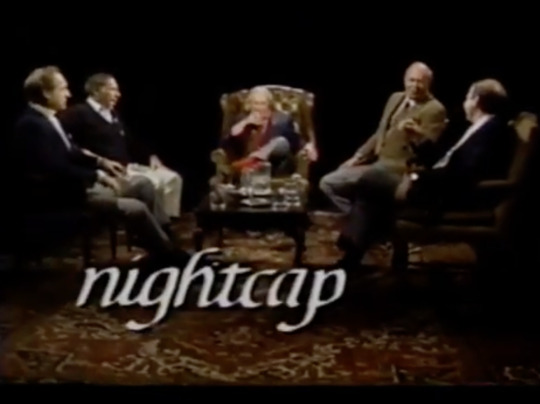



youtube
Studs Terkel presents Sid Caesar, Carl Reiner, and Mel Brooks (1984)
20 notes
·
View notes
Text
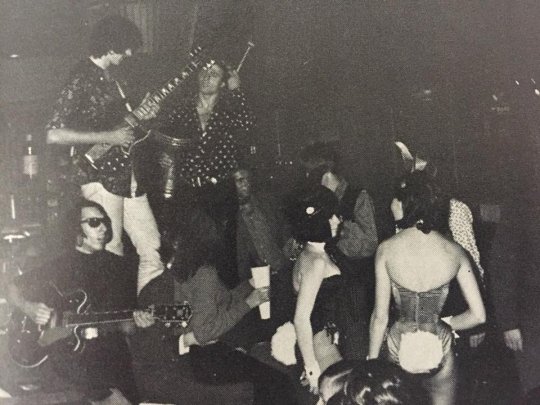
The Studs Terkel Show - The Exploding Plastic Inevitable, June 1966
Studs Terkel meets the Exploding Plastic Inevitable! This new-to-me artifact features Ingrid Superstar, Gerard Malanga, Sterling Morrison, Paul Morrissey and Steve Sesnick chatting with the legendary writer / broadcaster during the EPI's mid-1966 Chicago jaunt. Studs had caught the multimedia extravaganza a few nights before — and was bewildered! But in a good way, he seems genuinely curious about what these crazy kids are up to ... and even manages to get some straight answers out of them. Very cool stuff.
The Exploding Plastic Inevitable's Windy City trip was an interesting one — Lou Reed was MIA thanks to a bout of hepatitis and Nico was out in Europe with the jet set. As a result, the Velvet Underground played in a unique lineup with John Cale taking over on vocals, original drummer Angus MacLise returning to jam one last time and Moe Tucker moving over to bass and guitar.
Alas, there are only a handful of recordings of the Lou-less VU — "Venus In Furs" and "Heroin." There's also Ronald Nameth's disorienting film of the band at Poor Richard's. Too bad there's no tape of the Velvets discovering the riff for "Searching" — soon to transmogrify into none other than "Sister Ray." And too bad there's no tape of the VU entertaining the Bunnies at the Playboy Club, as pictured above.

30 notes
·
View notes
Text
"I want people to talk to one another no matter what their difference of opinion might be."
Studs Terkel, author and broadcaster (16 May 1912-2008)
8 notes
·
View notes
Photo
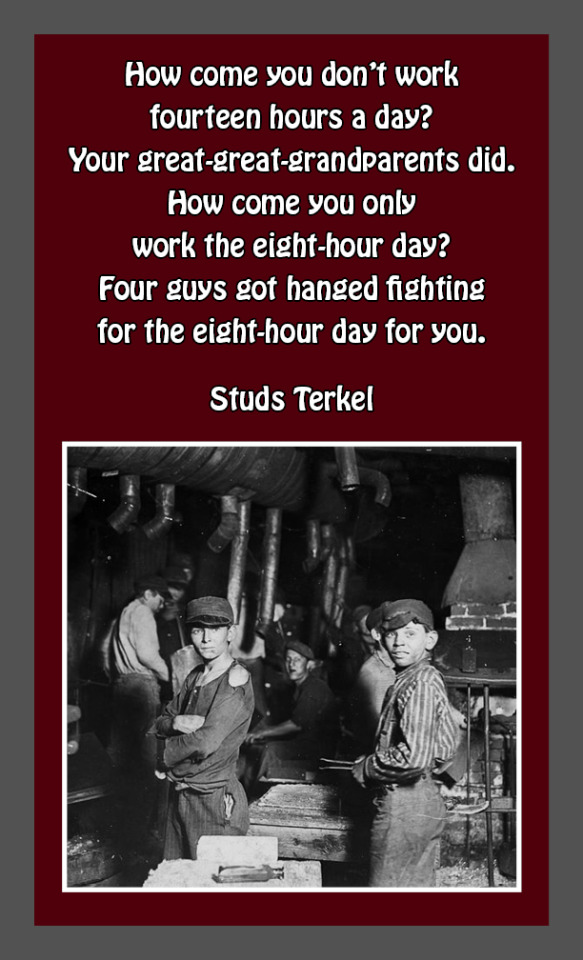
9 notes
·
View notes
Text

(1986)
So this was a hell of a thing to read. Almost 600 pages of accounts from veterans, survivors, and their children. Took weeks to read to give my brain a break because many stories wore me down. Poignant considering the topic, I guess.
I've read WWII stories and books for over a decade, so I was familiar with the broad events, but there was always something surprising me each day. Things you wouldn't see in movies or read about.
The one Russian veteran saying how his children and grandchildren were a centimeter away from never existing will be in my head for a long time. The US vet saying the atomic bomb saved him from fighting in Japan, a scientist working on it who said it was worth it to prevent further warfare, while later on you hear accounts from hibakusha, including another US vet stationed there getting terminal cancer from the lingering rads.
It was a war that many would fight again but they'd never want to see another war. Destruction of fascism, travelling to far places and cultures, economic opportunity, a purpose. With millions of people and animals dead with normalized ease, scars and disfigurement as reminders people want to sweep away, authority working with collaborators to turn on their former allies, the Bomb affecting the health and hopes of baby boomers.
An informed society should know war and what it brings. Even the best intentions lead to death that must be carried every day. When you're in war, rarely think about lofty ideals, but of survival for yourself and your buddies. No matter what you have to do.
2 notes
·
View notes
Text

Studs Terkel, May 16, 1912 – October 31, 2008.
1994 photo by Chris Felver.
13 notes
·
View notes
Text

From Working by Studs Terkel
2 notes
·
View notes

